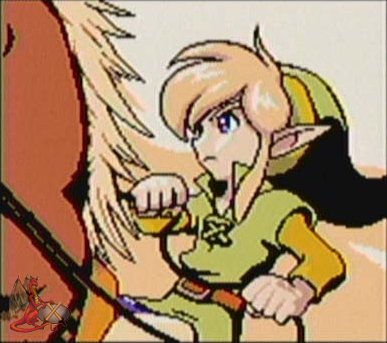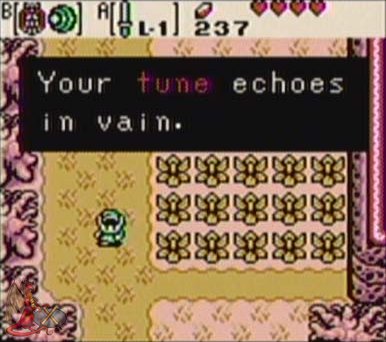|
|

|
PLATFORM
|
GBC
|
BATTLE SYSTEM
|

|
INTERACTION
|

|
ORIGINALITY
|

|
STORY
|

|
MUSIC & SOUND
|

|
VISUALS
|

|
CHALLENGE
|
Moderate
|
COMPLETION TIME
|
Less than 20 Hours
|
|
OVERALL

|
+ Good old Zelda gameplay with some tweaks.
+ Solid control.
+ Great music and graphics.
- Can feel like a retread.
- Story could have been better.
|
Click here for scoring definitions
|
|
|
The Triforce calls out to Link, and he is transported to a forest in the land of Labrynna, where he rescues Princess Zelda's nurse, Impa, and helps her find Nayru, the Oracle of Ages. However, Veran, a sorceress possessing Impa, proceeds to possess Nayru, disrupting the time flow in Labrynna, with Link needing to find the eight Essences of Time in the land's past and present to defeat Veran. Nintendo's The Legend of Zelda: Oracle of Ages, which was developed in conjunction with Capcom studio Flagship, saw its release on the Gameboy Color, returning the franchise to its 2-D roots after the 3-D Nintendo 64 installments. Oracle of Ages was paired with a sister title, Oracle of Seasons, and largely inherits the solid gameplay of Link's Awakening with some tweaks.
Link's adventure will take him across Labrynna in the past and in the present, with several harp songs giving him time-travel capabilities. Oracle of Ages, as mentioned, largely inherits the gameplay of Link's Awakening, with the player assigning tools to the A and B buttons, including Link's sword and shield as well as other tools necessary to advance through puzzles on the overworld and in dungeons such as a jumping feather, a grappling hook that magically exchanges link with whatever it grapples, and several types of seeds that provide effects such as setting fire and increasing his movement speed. A tool is also present that allows Link to shoot these seeds, which can rebound off walls.
 Nice art
Nice art
|
|
In the middle of dungeons are mini-bosses Link must defeat to advance, with a shortcut to and from the entrance appearing afterward. At the end of dungeons are the real bosses that typically require some kind of strategy and specific tools to defeat, and which drop a heart extending Link's health afterward; collecting four Pieces of Heart scattered across the world provides the same effect. As with other Zeldas, moreover, enemies drop random goods such as Rupees, necessary to purchase items at stores, recovery hearts, bombs, and so forth. It is also possible to buy a special potion that completely refills Link's health if it runs out, a decent safety net considering the lack of healing methods other than recovery hearts/fairies and fairy fountains.
A major addition to Oracle of Ages is the ring system, where the player can find various rings from treasure chests and nuts on trees that will grow if Link plants special seeds in soil patches across Labrynna. Link can take these rings to a special facility to "identify" them and reveal their effects, such as increasing attack damage but increasing damage taken, shielding Link from electric attacks, and so forth, with Link able to equip only one at a time. This addition isn't particularly the difference between victory and defeat, although the classic Zelda gameplay still serves the game well, nicely expanding upon the system in Link's Awakening.
Control is decent as well, with easy menus, a save-anywhere system, and a decent direction on how to advance the main storyline, even if doing so may require a bit of work and searching at times, the same going for dungeon navigation. Rooms in dungeons are also bigger than they were in Link's Awakening, now potentially spanning more than one screen. Indication on the in-game maps on which rooms have stairs would have been nice, but interaction in Oracle of Ages is still well above average.
 Singing to an empty audience
Singing to an empty audience
|
|
Oracle of Ages is largely a hybrid of elements from A Link to the Past (travel between two worlds) and Link's Awakening (A and B button tool system), and doesn't introduce anything particularly new to the series. Time travel was hardly new to video games in the title's time, as well, and the ring system isn't particularly creative, either. All in all, the game is largely a retread of elements from its predecessors with some minor tweaks.
The story, though, does something different other than making Link rescue Zelda, but still has a few series characters like her nurse, Impa, as well as many characters and the new races introduced in the Nintendo 64 games such as Tingle, the Zoras, the Gorons, and so forth. The game's backstory, revolving around Queen Ambi and her lost love, serves the game decently, with a twist later on in the game, and even some additional plot if the player links with data from Oracle of Seasons. The plot isn't astounding, given the weak pacing, but is half-decent, even if this title, as with most other series installments, is more about gameplay than story.
The game's aural presentation, though, is better, with a reasonable variety of sound effects and music, even if some of the themes come directly from Link's Awakening. The visuals also largely resemble those in Link's Awakening, not necessarily a bad thing, as they still look nice, with nice colors, environs, and some occasional anime scenes, though character sprites are still somewhat small and disproportionate. All in all, the aural and visual presentation of Oracle of Ages help the game a lot more than hurt.
Finally, the game is somewhat longer than other 2-D Zeldas, about fifteen hours, with exploring every corner of both worlds, not to mention a trading sidequest, mainly boosting this time. All in all, The Legend of Zelda: Oracle of Ages is a solid addition to the franchise, building upon the fun gameplay of Link's Awakening while also featuring solid control, sound, and graphics. Those who enjoyed previous Zeldas may find it to be a rehash, but it will likely satisfy loyal fans of the franchise and maybe those new to it.
Review Archives
|









